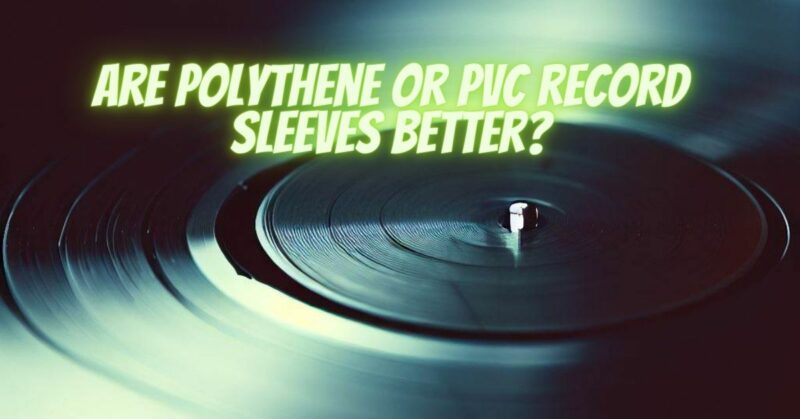Vinyl records are more than just music; they are cherished artifacts that hold both sentimental and artistic value. Protecting these treasures is a top priority for collectors and enthusiasts. When it comes to record sleeves, the choice between polyethylene and PVC can be a significant one. This article delves into the differences between polyethylene and PVC record sleeves, exploring their pros, cons, and the factors to consider when selecting the best protection for your vinyl collection.
Polyethylene Record Sleeves
Advantages:
- Clarity: Polyethylene sleeves are known for their high clarity, which allows for easy viewing of album artwork and labels without distortion.
- Non-reactive: Polyethylene is considered non-reactive, meaning it won’t chemically interact with vinyl records over time.
- Minimal Static: Polyethylene sleeves generate less static compared to PVC, reducing the attraction of dust and particles to the record’s surface.
- Archival Quality: Some polyethylene sleeves are made from archival-quality materials, ensuring long-term preservation.
Considerations:
- Stiffness: Polyethylene sleeves can be slightly stiffer than PVC, making it important to handle records with care during insertion and removal.
PVC Record Sleeves
Advantages:
- Flexibility: PVC sleeves are more pliable, making it easier to slide records in and out without causing stress on the vinyl or the jacket.
- Affordability: PVC sleeves are generally more cost-effective compared to some archival-quality polyethylene options.
- Wider Availability: PVC sleeves are widely available in various sizes and styles, making it easier to find sleeves that fit your collection.
Considerations:
- Chemical Interaction: PVC can release gases that might react with vinyl records over time, potentially causing discoloration or degradation.
Factors to Consider
Archival Preservation: If long-term preservation is a priority, look for polyethylene sleeves specifically labeled as “archival quality.” These sleeves are designed to provide maximum protection without compromising the record’s condition.
Clarity vs. Flexibility: Consider whether you value high clarity for album artwork and labels (polyethylene) or ease of use and flexibility (PVC) when inserting and removing records.
Static Considerations: If you’re concerned about static attraction and dust buildup, polyethylene sleeves are a better choice due to their reduced static generation.
Budget and Collection Size: PVC sleeves are generally more affordable, making them suitable for large collections. However, if budget allows, consider investing in high-quality polyethylene sleeves for your most prized records.
The choice between polyethylene and PVC record sleeves depends on your collection’s needs and your preservation goals. Polyethylene sleeves offer clarity, minimal static, and archival-quality options, making them ideal for long-term preservation. PVC sleeves provide flexibility, affordability, and wide availability, catering to collectors who prioritize ease of use and budget considerations. Whatever your preference, selecting the right record sleeves will contribute to the protection, longevity, and enjoyment of your valuable vinyl collection.


